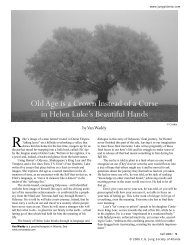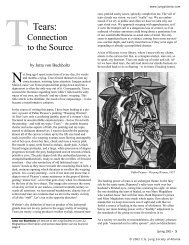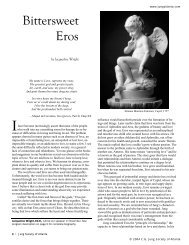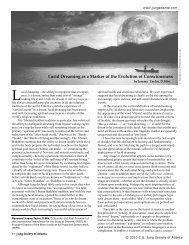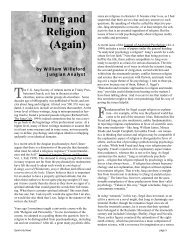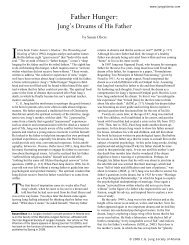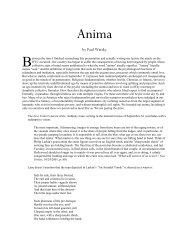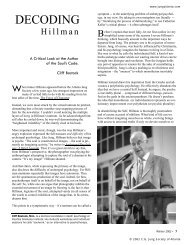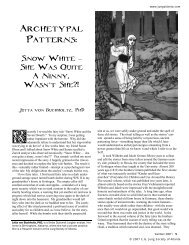Hermes and the Creation of Space - C.G. Jung Society of Atlanta
Hermes and the Creation of Space - C.G. Jung Society of Atlanta
Hermes and the Creation of Space - C.G. Jung Society of Atlanta
Create successful ePaper yourself
Turn your PDF publications into a flip-book with our unique Google optimized e-Paper software.
<strong>Hermes</strong> as Archetypal Image<br />
What is <strong>Hermes</strong>? Wind, magic, a puer spirit. But beyond that, he is a god, <strong>and</strong> to fathom what this<br />
means we need to plunge deeper into <strong>the</strong> connections between this mythic image <strong>and</strong> <strong>the</strong><br />
archetypal <strong>and</strong> instinctual base <strong>of</strong> <strong>the</strong> psyche from which he comes <strong>and</strong> which he represents. Why<br />
is he an immortal god? Where is his numinosity?<br />
Brown points out what many o<strong>the</strong>r scholars say as well, that <strong>the</strong> "name <strong>Hermes</strong> is probably<br />
derived from <strong>the</strong> Greek word for 'stone-heap,' herma, <strong>and</strong> signifies 'he <strong>of</strong> <strong>the</strong> stone-heap'" (p. 33).<br />
Martin Nilsson, in his delightful little book, Greek Folk Religion, imagines a peasant walking<br />
through <strong>the</strong> Greek countryside. He writes:<br />
If our peasant passed a heap <strong>of</strong> stones, as he was likely to do,<br />
he might lay ano<strong>the</strong>r stone upon it. If a tall stone was erected on<br />
top <strong>of</strong> <strong>the</strong> heap, he might place before it a bit <strong>of</strong> his provision as<br />
an <strong>of</strong>fering. He performed this act as a result <strong>of</strong> custom, without<br />
knowing <strong>the</strong> real reason for it, but he knew that a god was<br />
embodied in <strong>the</strong> stone heap <strong>and</strong> in <strong>the</strong> tall stone st<strong>and</strong>ing on top<br />
<strong>of</strong> it. He named <strong>the</strong> god <strong>Hermes</strong> after <strong>the</strong> stone heap (herma) in<br />
which he dwelt, <strong>and</strong> he called <strong>the</strong> tall stone a herm. Such heaps<br />
were welcome l<strong>and</strong>marks to <strong>the</strong> w<strong>and</strong>erer who sought his way<br />
from one place to ano<strong>the</strong>r through desert tracts, <strong>and</strong> <strong>the</strong>ir god<br />
became <strong>the</strong> protector <strong>of</strong> wayfarers. And if, by chance, <strong>the</strong> wayfarer<br />
found on <strong>the</strong> stone heap something, probably an <strong>of</strong>fering, which<br />
would be welcome to <strong>the</strong> poor <strong>and</strong> hungry, he ascribed this lucky<br />
find to <strong>the</strong> grace <strong>of</strong> <strong>the</strong> god <strong>and</strong> called it a hermaion. (p. 8)<br />
The name <strong>Hermes</strong> is connected with <strong>the</strong> name for <strong>the</strong> stone heap that was a boundary-marker, a<br />
herma. This is <strong>the</strong> physical fact from which <strong>the</strong> experience <strong>of</strong> <strong>Hermes</strong> springs, in which it is<br />
grounded. Around this concrete phenomenon <strong>of</strong> <strong>the</strong> boundary-marker <strong>the</strong>re grew up <strong>the</strong> many<br />
associated features <strong>and</strong> qualities that go into making this god what he is. Something about <strong>the</strong><br />
experience <strong>of</strong> herma <strong>and</strong> boundaries <strong>and</strong> cross-roads stimulated <strong>the</strong> Greek imagination into<br />
elaborating <strong>the</strong> figure <strong>of</strong> <strong>Hermes</strong>.<br />
Nilsson continues his imaginative presentation by saying that this stone heap at <strong>the</strong> crossroads<br />
might have marked a grave, <strong>and</strong> perhaps <strong>the</strong>re was a body buried under it. This would mark a<br />
space that was a crossroad in a double sense, with one axis horizontal, ano<strong>the</strong>r vertical: A threedimensional<br />
cross-roads. <strong>Hermes</strong> is a god <strong>of</strong> travelers living <strong>and</strong> dead, his monument <strong>of</strong> stones a<br />
boundary marker for <strong>the</strong> world on this plane <strong>and</strong> between it <strong>and</strong> <strong>the</strong> underworld. Kerenyi, in his<br />
masterful study, <strong>Hermes</strong>, Guide <strong>of</strong> Souls, emphasizes <strong>the</strong> god's role in traversing <strong>the</strong> boundary<br />
between life <strong>and</strong> death, between this world <strong>and</strong> <strong>the</strong> underworld <strong>of</strong> shades, Hades. Because <strong>of</strong> his<br />
association with boundaries <strong>and</strong> with <strong>the</strong> realm <strong>of</strong> shades, <strong>Hermes</strong> takes on <strong>the</strong> features <strong>of</strong> a<br />
liminal god, or <strong>of</strong> what I have called a god <strong>of</strong> liminality in my book In MidLife, that is, one who<br />
inhabits interstices, a denizen <strong>of</strong> betwixt-<strong>and</strong>-between (cf. Turner). He st<strong>and</strong>s at <strong>the</strong> edge not only<br />
geographically <strong>and</strong> interpersonally but also metaphysically. He is essentially in <strong>and</strong> <strong>of</strong> <strong>the</strong> world <strong>of</strong><br />
liminality.<br />
The element <strong>of</strong> uncanniness, which Walter Otto so forcefully stresses in his chapter on <strong>Hermes</strong> in<br />
The Homeric Gods, would attach to <strong>Hermes</strong> because <strong>of</strong> this close association with <strong>the</strong> spirits <strong>of</strong><br />
<strong>the</strong> dead <strong>and</strong> <strong>the</strong> underworld. The Oxford Classical Dictionary states flatly that while <strong>Hermes</strong><br />
appears as a youth, he "...is probably one <strong>of</strong> <strong>the</strong> oldest [<strong>of</strong> <strong>the</strong> gods] <strong>and</strong> most nearly primitive in<br />
origin....<strong>and</strong> signifies <strong>the</strong> daemon who haunts or occupies a heap <strong>of</strong> stones, or perhaps a stone, set<br />
up by <strong>the</strong> roadside for some magical purpose" (pp.502-3). Again, we come upon <strong>the</strong> notion <strong>of</strong><br />
magic in connection with <strong>Hermes</strong>.




